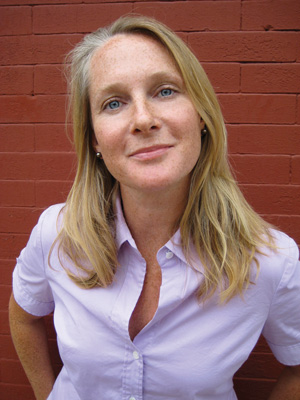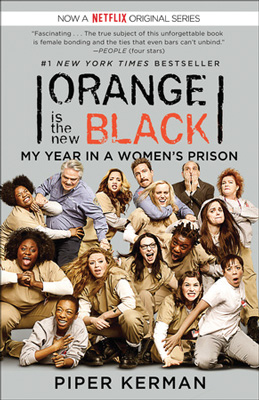An interview with Piper Kerman
Permanent link All Posts
As a fan of the Netflix original series Orange is the New Black, I jumped at the chance to talk with Piper Kerman and learn more about the real story of the woman whose experiences and bestselling memoir of the same name inspired the show.
In her book Orange is the New Black: My Year in a Woman's Prison (Spiegel & Grau), Kerman recounts the year (2004-2005) she spent in the Danbury Correctional Facility for a crime she had committed 10 years prior—delivering a suitcase of drug money. With the support of her loving family and fiancé and the friendships of women she meets in prison, Kerman makes it through her sentence and leaves a prison reform activist and with an incredible story to tell.
The show, adapted by Jenji Kohan into an Emmy- and Peabody Award-winning original series for Netflix, is currently nominated for a Golden Globe in the comedy category.

Kerman, who lives in New York with her family, works in public interest communications, serves on the board of the Women's Prison Association, and delivers lectures to students, women's groups, and others on the issues of justice reform—will be visiting Chicago this month to speak at a JUF's Young Women's Board event. In advance of her visit, she spoke to Oy!Chicago about how faith played a role in her time in prison, what she thinks about the show, and what's next for her:
Oy!Chicago: Why did you decide to write your story of your time in prison? What were you hoping your readers would take away from your experiences?
Piper Kerman: I really think that female prisoners, women in prison or jail in this country, are very emblematic of the kind of people we have chosen to incarcerate in the last 30 years that we never would have incarcerated before. People who have committed crimes who are not violent or people who have committed sometimes very low-level crimes, that's pretty typical of women in prison. And so I think that's important because the US has grown to have the biggest prison population in human history. No society has ever incarcerated so many of its citizens as we now choose to do. And that's worth a look and that's worth discussion and the lens of the female experience is a particularly unique way of looking at that.
How do you think you've changed people's perception of what life in prison is like?
First and foremost when we think of prisons or prisoners, we don't typically think of women first. So the very fact of my own story and who the book deals with confronts our assumptions about prisons and about prisoners. What I simply tried to do in the book was talk about who is really in prison in this country, what are the real reasons they are there, what are the pathways that people follow into prison and what really happens to people behind the walls of the jail because that is a world that is very intentionally hidden away from the public view so of course people are in fact very curious about it.
There are many mentions of faith throughout your book. You say that your time in prison made you less skeptical about faith and also that in some cases it helped the women in Danbury see beyond themselves and focus on what they had to give. Tell us more about your personal experience with faith and the role of faith in prison.
Faith definitely plays a big part in the experience of incarceration—I think that's true for both men and women. A prison is a place where you see a lot of people relying on their faith as something that helps them get through what is a very difficult experience. In prison, people are forced to deal with one another, with people of different faiths. Because prison is of course exceptionally close quarters, you don't have any choice about who you'll be coexisting with and you see some interesting things play out in that realm. I think that's a really important and fundamental facet of the experience of incarceration.
I can tell you that in Season 3 of the show, an exploration of faith is an important part of the story line.
It seems like you made a lot of incredible friendships during your time in prison that helped you through your time.
I was very lucky I was able to afford really stellar representation. I was able to afford a private attorney who spent a lot of time on my case and was a great lawyer—I'm so grateful to him. His last piece of advice to me when I was going to be sent to prison was 'don't make any friends, Piper.' And I think that was well-intentioned advice, but actually I don't know how you could possibly survive prison without friends. I don't know that anyone gets sent off to prison with the expectation that they're going to forge these very powerful friendships but that is what happens. I think that's an essential part of surviving the crucible of incarceration. Those women are so important to me and many of them are still part of my life today and I'm very grateful to them.
How does it feel to watch your story, though fictionalized, play out through the show. Do people confuse the show with your reality?
That may be but that doesn't really matter much to me. I think that Jenji Kohan has done a really phenomenal job—she is a brilliant woman and [it's] a very smart adaptation. I sometimes say that Jenji takes the book, she puts it into a blender, she puts a lot of other ingredients into the blender and then she pushes liquefy and I'm absolutely fine with that. [The character of] Piper Chapman is really a combination of Jenji's writing and Taylor Schilling's acting and I don't watch that character and think oh that's me, they're getting it wrong or they're getting it right. I watch it obviously with a different eye than most viewers, but still I'm really enjoying Jenji's adaptation.
Did you ever expect your book and then the show to take off as they have? Why do you think it is that your story is so engaging for people?
I think that every writer fantasizes success—you'd literally never finish a book if you didn't. But that said, I could never have imagined that all the things that have come to pass would happen. I think in a very simple way that the book and my own story offer people a way into trying to understand the question of mass incarceration, the question of why does America have so many prisoners, why do we put so many more people in prison than any other society in the world. That's an important question, for all people, particularly people of conscience.
I'm sure you spend a lot of time talking about that year in prison. Tell us what you've been up to since then.
I'm very fortunate because I get to do the work that is important to me, and that's been true for many years before the book came out. I've done public interest communications work ever since I came home from prison and I'm really grateful for that. And the opportunities to talk to women's groups and to students on campus and to various and sundry other people in the community who are curious about these issues is really rewarding because these issues deserve a really good long consideration.
What's next for you?
I have a new book project which I will be beginning in the new year and I can't say much more about it. But it will remain focused on the criminal justice system and is set in the Midwest.
JUF's Young Women's Board Valor 2015 event featuring an evening with Piper Kerman, will be held Jan. 29 at The Art Center Highland Park. A $750 minimum individual women's contribution to the 2015 JUF Annual Campaign is required to attend. Couvert - $50. For more information or to register online visit www.juf.org/ywbvalor.



.jpg)



